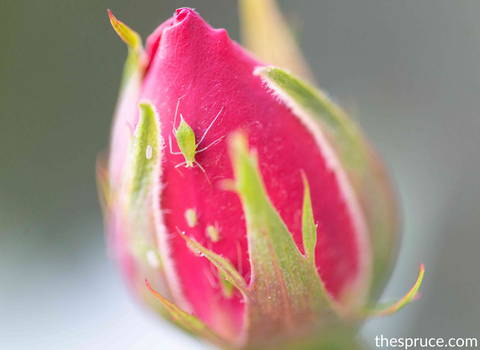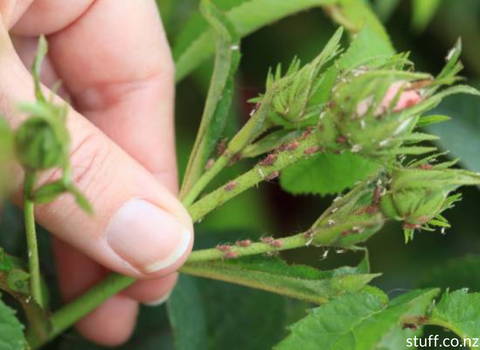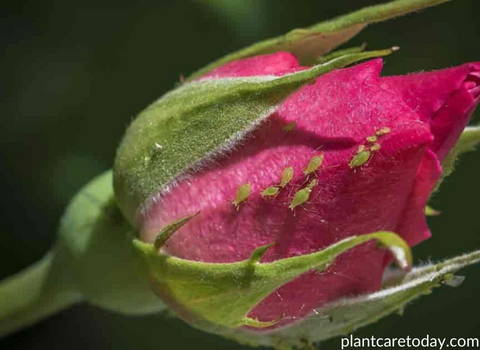Aphids on Roses – How to Get Rid of Aphids on Roses
Aphids like visiting plants and rose bushes yearly and can attack them easily. Certain species like the Macrosiphum euphorbiae (Potato aphid) or Macrosiphum rosae (Rose aphid) are known to attack flowering plants. For you to keep beautiful roses and other flowering plants, you must control aphids before it is too late.
When you start noticing that the rosebuds in your garden are puckered and wrinkled and you start seeing new leaves curling, then aphids should be your primary suspects. If you will inspect them closely, you will see tiny, pinkish, or green soft-bodied insects that are feeding on the succulent new growth.
Aphids pierce plant tissue and suck out vital plant juices, which result in damaging roses. Tender buds, new leaves, and soft stems are the ones that aphids damage. Because of aphids, roses that look beautiful and fine today can suddenly turn distorted and stressed.
Seeing one or two aphids can be inconsequential. However, the aphid population multiplies easily and quickly. It is their unusual ability to reproduce even without mating.
Adult females bear many generations of live young that can mature within one week. They can hastily overtake your rose garden and other favourite flowering plants.
Aphids also excrete honeydew, which is a sticky substance that attracts ants as well as other pests. This in turn develops into an unpleasant sooty mold.
How to Get Rid of Aphids on Roses
In light cases of aphid infestation on roses, you can easily pick them off by hand then simply squish them to control aphid damage. Sometimes, simply tapping the foliage or bloom to knock the pests to the ground. Once they fall to the ground, they will become easier prey for other insects.
Strong Water Spray Method
The use of the strong water spray method is also seen as effective in handling lighter cases of aphids damaging rose bushes. All you need is to get your garden hose end water sprayer, spray the blooms and foliage down well.
You need to make sure that the spray of water is strong enough to knock off the pests but is not strong enough to defoliate the plant or rose bush. The last thing that you want to do is damage the blooms with too much pressure from the water spray.
Do this for a couple of days to keep the aphids off the bushes or plants.
However, the problem with this method is that it may cause black spots or powdery mildew because of water, moisture, and rose leaves. You can still use this as a temporary solution, but you need to opt for other permanent and less damaging solutions for your roses and other flowering plants.
Neem Oil
If you want another natural approach in dealing with aphids on roses, you can opt for neem oil. It is among the favourite natural pest control option used for scale insects, aphids, mealybugs, spider mites, and other garden insects.
The oil is known to have low toxicity for humans and animals, which is why it is considered a go-to natural and powerful insect deterrent.
It is effective in naturally getting rid of soft-bodied insects. It also interferes with the feeding activities of tougher and larger insects like beetles.
Liquid Soap Spray Solution
This is a homemade spray solution that you can also use for small outbreaks. All you need are two ingredients that you will put in a clean sprayer or spray bottle:
Dish soap – pure liquid castile soap without additives such as fragrance, chemicals, or moisturizer.
Water
Follow the steps below to make the solution spray:
Prepare a quart of water and mix in a tablespoon of soap. For every gallon of spray solution that you will prepare, add about 4 to 5 tablespoons to a gallon of water.
Mix the solution thoroughly and use it immediately.
For this solution to be more effective, evenly coat the plants including the undersides of leaves. This will only be effective if insects will come into contact with the solution. So, you need to make sure that all areas of the plants are coated with the solution.
Nitrogen Fertilizers
Since aphids are nitrogen feeders, another way to control aphids is by using slow or (urea-based) time-release nitrogen fertilizers. The less nitrogen in the plants means it will less likely attract aphids. Most organic fertilizers fit into the time-release category, so you might want to try those.
Other Good Insects
You can also make use of other good insects in your garden. Ladybugs or lady beetles are beneficial insects. Their larvae and green lacewings larvae can help in aphid control. However, this may take some time before it works effectively in your garden.
If your garden is under a severe level of aphid infestations, this method may not provide the results that you need in the shortest time possible.
Insecticidal Soap
Unlike detergent and hand-washing dish soap, insect-killing soap is different and does not work like the usual soaps you will find in the store.
Castile soap is known to contain fatty acids and is lethal to insects. This content removes or dissolves the natural waxy protective coating and cell membranes of soft-bodied insects. This will dehydrate the insects and eventually die because of excessive water loss.
If you are searching for effective insecticidal soaps for your garden, you can try Safers Rose & Flower Insecticide RTU 1L or go to pestsupplycanada.ca for more options. There are other products such as horticultural oils that will also work effectively in getting rid of aphids and other garden pests.
Common Species of Aphids Found on Rose Bushes
Various species of aphids can attack different kinds of plants. Some of these species are:
Green Peach Aphid
Oleander Aphids
Apple Aphids
However, there are species that only fancy rose bushes, and these two rose aphids are:
Macrosiphum Euphorbiae (Potato Aphid)
Macrosiphum Rosae (Rose Aphid)
The feeding season of aphids usually starts every spring. When the temperatures start reaching 50° F, they will start coming out and begin hatching.
Because of the warm spring weather, new growth emerges, and plant juices start flowing. The live young pests feed on these juices, which is why their population starts increasing and reaching its peak in early summer.
Since beneficial insects that also help in controlling these pests do not hatch in the same temperatures, this allows the aphid population to increase. These beneficial bugs will have to establish first before they begin working on controlling the presence of these pests.
During these times, you should use sprays and other pest control products that will prevent the colony from growing. This also maintains the balance in your garden while waiting for the beneficial bugs to start attacking aphids.
Since there are bugs that will help you in achieving full aphid control, this will also reduce the need for continuous spraying. Also, the sprays will not harm or wipe out beneficial bugs in your garden.
Products we recommend for added protection to your plants against aphids are:




